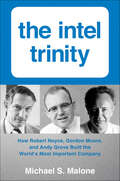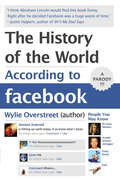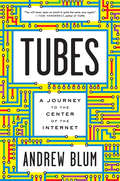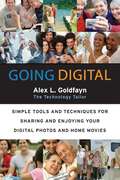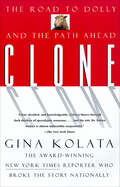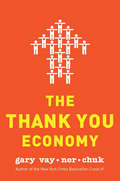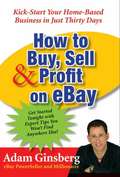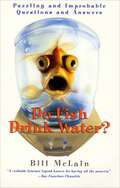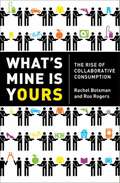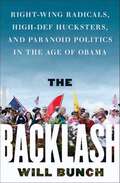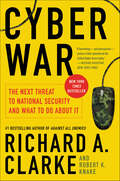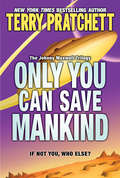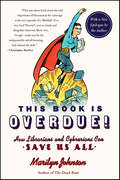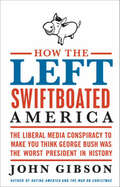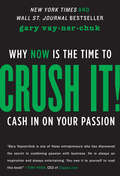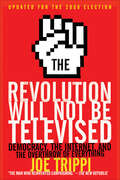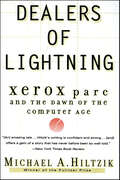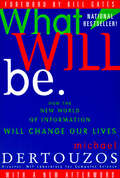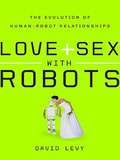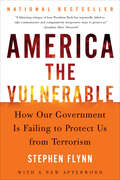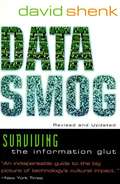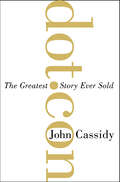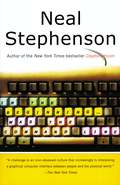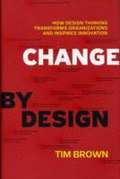- Table View
- List View
The Intel Trinity: How Robert Noyce, Gordon Moore, and Andy Grove Built the World's Most Important Company
by Michael S. MaloneBased on unprecedented access to the corporation’s archives, The Intel Trinity is the first full history of Intel Corporation—the essential company of the digital age— told through the lives of the three most important figures in the company’s history: Robert Noyce, Gordon Moore, and Andy Grove.Often hailed the “most important company in the world,” Intel remains, more than four decades after its inception, a defining company of the global digital economy. The legendary inventors of the microprocessor-the single most important product in the modern world-Intel today builds the tiny “engines” that power almost every intelligent electronic device on the planet.But the true story of Intel is the human story of the trio of geniuses behind it. Michael S. Malone reveals how each brought different things to Intel, and at different times. Noyce, the most respected high tech figure of his generation, brought credibility (and money) to the company’s founding; Moore made Intel the world’s technological leader; and Grove, has relentlessly driven the company to ever-higher levels of success and competitiveness. Without any one of these figures, Intel would never have achieved its historic success; with them, Intel made possible the personal computer, Internet, telecommunications, and the personal electronics revolutions.The Intel Trinity is not just the story of Intel’s legendary past; it also offers an analysis of the formidable challenges that lie ahead as the company struggles to maintain its dominance, its culture, and its legacy.With eight pages of black-and-white photos.
The History of the World According to Facebook
by Wylie OverstreetThe Sun is now friends with Earth and 7 other planetsPluto: Not cool.What if Facebook had emerged with the Big Bang, and every historical event took place online? Imagine how we’d we see history if . . .On April 15, 1865, Abraham Lincoln updated his status: "Taking the missus to the theater"God and Stephen Hawking trolled each other in a comment war over the creation of the universe?Alexander the Great "checked into" all the countries he conqueredDonald Trump and Vladimir Putin "Liked" each other's cryptic statusesIrreverent and clever, The History of the World According to Facebook goes back through time, from the beginning of the world to the present, to cover all the major events and eras of human history, such as the Renaissance, the Industrial Revolution, and the Information Age. Filled with hundreds of actual figures from across the centuries and thousands of invented statuses, comments, and actions lampooning Facebook users’ penchant for oversharing, abbreviation, self-importance, and lazy jargon, The History of the World According to Facebook defies all attempts at taking the multi-billion user social media platform SRSLY. It is the funniest parody of history and the dawn of man since, well, the dawn of man.
Tubes
by Andrew BlumWhen your Internet cable leaves your living room, where does it go? Almost everything about our day-to-day lives--and the broader scheme of human culture--can be found on the Internet. But what is it physically? And where is it really? Our mental map of the network is as blank as the map of the ocean that Columbus carried on his first Atlantic voyage. The Internet, its material nuts and bolts, is an unexplored territory. Until now. In Tubes, journalist Andrew Blum goes inside the Internet's physical infrastructure and flips on the lights, revealing an utterly fresh look at the online world we think we know. It is a shockingly tactile realm of unmarked compounds, populated by a special caste of engineer who pieces together our networks by hand; where glass fibers pulse with light and creaky telegraph buildings, tortuously rewired, become communication hubs once again. From the room in Los Angeles where the Internet first flickered to life to the caverns beneath Manhattan where new fiber-optic cable is buried; from the coast of Portugal, where a ten-thousand-mile undersea cable just two thumbs wide connects Europe and Africa, to the wilds of the Pacific Northwest, where Google, Microsoft, and Facebook have built monumental data centers--Blum chronicles the dramatic story of the Internet's development, explains how it all works, and takes the first-ever in-depth look inside its hidden monuments. This is a book about real places on the map: their sounds and smells, their storied pasts, their physical details, and the people who live there. For all the talk of the "placelessness" of our digital age, the Internet is as fixed in real, physical spaces as the railroad or telephone. You can map it and touch it, and you can visit it. Is the Internet in fact "a series of tubes" as Ted Stevens, the late senator from Alaska, once famously described it? How can we know the Internet's possibilities if we don't know its parts? Like Tracy Kidder's classic The Soul of a New Machine or Tom Vanderbilt's recent bestseller Traffic, Tubes combines on-the-ground reporting and lucid explanation into an engaging, mind-bending narrative to help us understand the physical world that underlies our digital lives.
Going Digital: Simple Tools and Techniques for Sharing and Enjoying Your Digital Photos and Home Movies
by Alex L. GoldfaynGet digital prints that look better than film, create amazing photo and video DVDs, and even learn to use your camera phone to its maximum potential with this non-technical, easy-to-understand guide Imagine displaying your photos on your television in big-screen glory, set to your favorite music. Imagine digitizing your old home movies, editing out unwanted parts, and sharing them on DVDs. And imagine sharing photos and movies of your child's first steps moments after they happen -- online, over the cell phone, or even on an electronic picture frame half a world away. With today's technology, all that is possible -- and more! Going Digital will arm you with the tools and techniques you need to share your digital memories with friends and family -- online and offline, on the computer, and in the living room. Written in down-to-earth language for people with all levels of technological knowledge, it's a user-friendly guide that will change your life -- and your family's.
Clone: The Road To Dolly, And The Path Ahead
by Gina KolataThe birth of Dolly -- the world's first clone -- placed in our hands the secret of creation. Few discoveries have so altered our notion of what it means to be human, or presented such a Gordian knot of ethical, spiritual, and scientific questions. Noted science journalist Gina Kolata broke the news nationally in The New York Times and was the first reporter to speak with Dr. Ian Wilmut, the embryologist who cloned Dolly. Now Kolata reveals the story behind Dolly, interweaving the social and cultural tales of our fear and fascination with cloning, reaching back nearly a century, with the riveting scientific accountof how a clone came to be and the mind-boggling questions Dolly presents for our future.Clone is a compelling blend of scientific suspense, dreams dashed, and frauds exposed, with provocative philosophical questions and an astute assessment of why Dolly's birth was only possible now. Like The Making of the Atomic Bomb, Lucy, and Chaos, this book gives us a window on history in the making, and an understanding of its profound effect on our lives.
The Thank You Economy
by Gary Vaynerchuk“Gary Vaynerchuk has seen the future of marketing. The Thank You Economy shows how it's built on both the time-honored techniques of listening to and appreciating customers and newer services like Twitter that allow you to engage directly with customers at unprecedented scale and speed. The book, like Gary, is also a lot of fun and full of passion.” —Dick Costolo, chief executive officer, TwitterGary Vaynerchuk, the New York Times bestselling author and creator of Wine Library TV, is back with a bold and expansive look at the evolution of today's marketplace, revealing the essential factors defining and driving successful relationships between businesses and consumers. In this groundbreaking follow-up to the bestselling Crush It!, Vaynerchuk—one of Bloomberg Businessweek’s “20 People Every Entrepreneur Should Follow”—looks beyond a numbers-based analysis to explore the value of social interactions in building our economy.
How to Buy, Sell, and Profit on eBay
by Adam GinsbergA lively insider's guide to starting a successful small business selling items old and new on eBay, written with personal anecdotes, well-kept secrets, and insider tips by Adam Ginsberg, eBay's most successful private salesperson. This is the insider's guide to making money on eBay. Adam Ginsberg is the most successful seller on eBay, moving around a million dollars' worth of merchandise every month. Not only will he impart his personal secrets on how to sell on eBay -learned through years of experience - and his tips on expanding your small business using eBay as a global market, but he'll also give fun side-notes and anecdotes, keeping the book lively and making it a fun and interesting read. This book will be a must-have for all current and aspiring eBay sellers, all small-business owners, and anyone who wants to learn how to start a million-dollar company.
Do Fish Drink Water?: Puzzling and Improbable Questions and Answers
by Bill McLainIs it true that elephants are afraid of mice?How much gold does the United States store in Fort Knox?Why do I get a headache when I eat ice cream too fast?How did the "seventh inning stretch" originate?As the official webmaster for Xerox, Bill McLain was surprised by the kinds of questions he was receiving, like whether people born blind can see in their dreams and why rabbits are associated with Easter. McLain began to answer each and every question--attracting national attention from MSNBC, CNN, and People--and the result, collected in Do Fish Drink Water?, is a surprising, funny, and informative collection of facts. McLain's answers can often be as wild as the questions and prompt entertaining anecdotes about where he found them. McLain explains how magnets are made, what caused the Great Depression of 1922, and even explains why cats purr. Also included is an extensive list of websites where he conducts research, offering an informative guide to making the most of the Internet.
What's Mine Is Yours: The Rise of Collaborative Consumption
by Rachel Botsman Roo Rogers“Amidst a thousand tirades against the excesses and waste of consumer society, What’s Mine Is Yours offers us something genuinely new and invigorating: a way out.” —Steven Johnson, author of The Invention of Air and The Ghost MapA groundbreaking and original book, What’s Mine is Yours articulates for the first time the roots of "collaborative consumption," Rachel Botsman and Roo Roger's timely new coinage for the technology-based peer communities that are transforming the traditional landscape of business, consumerism, and the way we live. Readers captivated by Chris Anderson’s The Long Tail, Van Jones’ The Green Collar Economy or Malcolm Gladwell’s The Tipping Point will be wowed by this landmark contribution to the evolving ecology of commerce and sustainability.
The Backlash: Right-Wing Radicals, High-Def Hucksters, and Paranoid Politics in the Age of Obama
by Will BunchIn The Backlash, Liberal columnist and Pulitzer Prize-winning political reporter Will Bunch goes behind the scenes of America’s new extreme right-wing minority to explore how their campaign of misinformation, their distortion of President Obama, and their collective fear of the future combine to pose a very real threat to our democratic system. From health care reform to immigration policies, The Backlash is a gripping investigation into the emerging voice of the dangerous American right wing.
Cyber War: The Next Threat to National Security and What to Do About It
by Richard A. Clarke Robert K. KnakeAn essential, eye-opening book about cyberterrorism, cyber war, and the next great threat to our national security. “Cyber War may be the most important book about national security policy in the last several years.” –SlateFormer presidential advisor and counter-terrorism expert Richard A. Clarke sounds a timely and chilling warning about America’s vulnerability in a terrifying new international conflict. Cyber War is a powerful book about technology, government, and military strategy; about criminals, spies, soldiers, and hackers. It explains clearly and convincingly what cyber war is, and how vulnerable we are as a nation and as individuals to the vast and looming web of cyber criminals.Every concerned American should read this startling and explosive book that offers an insider’s view of White House ‘Situation Room’ operations and carries the reader to the frontlines of our cyber defense. Cyber War exposes a virulent threat to our nation’s security.
Only You Can Save Mankind (Johnny Maxwell Trilogy #1)
by Terry PratchettThe alien spaceship is in his sights. His finger is on the Fire button. Johnny Maxwell is about to set the new high score on the computer game Only You Can Save Mankind. <P><P>Suddenly:We wish to talk. <P><P>Huh? <P><P> We surrender. <P><P>The aliens aren't supposed to surrender -- they're supposed to die! Now what is Johnny going to do with a fleet of alien prisoners who know their rights under the international rules of war and are demanding safe-conduct? It's hard enough trying to save Mankind from the Galactic Hordes. It's even harder trying to save the Galactic Hordes from Mankind. <P><P>But it's just a game, isn't it? Isn't it? <P><P>Master storyteller Terry Pratchett leaves readers breathless -- with laughter, and with suspense -- in a reality-bending tale of virtual heroism.
Mrs. Yonkers Is Bonkers! (My Weird School #18)
by Dan Gutman Jim PaillotSomething weird is going on!Mrs. Yonkers, the computer teacher, is the nerdiest teacher in the history of the world. She can type with her feet! She buys foam cheeseheads off eBay! She even puts a Webcam on a turtle! Is she trying to take over the planet?
This Book Is Overdue!: How Librarians and Cybrarians Can Save Us All
by Marilyn JohnsonIn This Book is Overdue!, acclaimed author Marilyn Johnson celebrates libraries and librarians, and, as she did in her popular first book, The Dead Beat, discovers offbeat and eloquent characters in the quietest corners. In defiance of doomsayers, Johnson finds librarians more vital and necessary than ever, as they fuse the tools of the digital age with love for the written word and the enduring values of truth, service to all, and free speech. This Book Is Overdue! is a romp through the ranks of information professionals who organize our messy world and offer old-fashioned human help through the maze.
How the Left Swiftboated America: The Liberal Media Conspiracy to Make You Think George Bush Was the Worst President in History
by John GibsonIn How the Left Swiftboated America, FOX commentator and bestselling author John Gibson offers the first comprehensive defense of the Bush presidency against its numerous detractors. In this provocative political work, Gibson explores who was right and who was wrong in taking us into the Iraq War and a host of other issues, arguing that it was the Left that actually lied while claiming to expose the truth.
Crush It!: Why NOW Is the Time to Cash In on Your Passion
by Gary VaynerchukIn Crush It!, online marketing trailblazer Gary Vaynerchuk tells business owners what they need to do to boost their sales using the internet—just as he has done to build his family’s wine store from a $4 million business to a $60 million one. Crush It! will show readers how to find their passion, then step by step how to turn it into a flourishing, monetized business.
The Revolution Will Not Be Televised: Democracy, the Internet, and the Overthrow of Everything
by Joe TrippiIn a blend of Wired magazine and The Boys on the Bus, the man who invented Internet politics tells the story of how it was done and reveals how every sector can benefit from tech revolution.Campaign manager Joe Trippi, who signed on to run Howard Dean’s campaign when there was less than $100,000 in the till and fewer than 500 people involved, transformed the most obsure candidate in the field into the Democratic frontrunner and all-but-coronated party nominee in less than a year. The secret of Trippi’s off-the-charts success: a revolutionary use of the Internet, and an impassioned, contagious desire to overthrow politics-as-usual. Before Dean knew it, he had a groundswell of 600,000 Americans behind him, was leading in every poll, and had raised $45 million—more money than any Democrat in history. We now know that unprecedented fundraising, unheard-of numbers of people checking in on the Internet, chatting on blogs, reaching out to their fellow voters and showing up at house parties really can compete with—and in so many ways exceed— the more traditional approaches to winning in politics. But the why’s and how’s leave much fertile ground to plow, and for the first time, Trippi, an icon to all the Dean supporters he energized, is sharing his lessons learned, along with colorful behind-the-scenes stories from the campaign trail. Perhaps lulled by the bust of the dot.com boom, many have dismissed the Internet as old news. But if Dean’s campaign wasn’t enough of a wake-up call, this book is: Trippi reveals just how the sleeping power of technology can be harnessed, and illuminates how every organization and individual in America can benefit from the tidal wave of change on the horizon.
Dealers of Lightning: Xerox PARC and the Dawn of the Computer Age
by Michael A. HiltzikIn the bestselling tradition of The Soul of a New Machine, Dealers of Lightning is a fascinating journey of intellectual creation. In the 1970s and '80s, Xerox Corporation brought together a brain-trust of engineering geniuses, a group of computer eccentrics dubbed PARC. This brilliant group created several monumental innovations that triggered a technological revolution, including the first personal computer, the laser printer, and the graphical interface (one of the main precursors of the Internet), only to see these breakthroughs rejected by the corporation. Yet, instead of giving up, these determined inventors turned their ideas into empires that radically altered contemporary life and changed the world.Based on extensive interviews with the scientists, engineers, administrators, and executives who lived the story, this riveting chronicle details PARC's humble beginnings through its triumph as a hothouse for ideas, and shows why Xerox was never able to grasp, and ultimately exploit, the cutting-edge innovations PARC delivered. Dealers of Lightning offers an unprecedented look at the ideas, the inventions, and the individuals that propelled Xerox PARC to the frontier of technohistoiy--and the corporate machinations that almost prevented it from achieving greatness.
What Will Be: How the New World of Information Will Change Our Lives
by Michael L. DertouzosMichael Dertouzos has been an insightful commentator and an active participant in the creation of the Information Age.Now, in What Will Be, he offers a thought-provoking and entertaining vision of the world of the next decade -- and of the next century. Dertouzos examines the impact that the following new technologies and challenges will have on our lives as the Information Revolution progresses:all the music, film and text ever produced will be available on-demand in our own homesyour "bodynet" will let you make phone calls, check email and pay bills as you walk down the streetadvances in telecommunication will radically alter the role of face-to-face contact in our livesglobal disparities in infrastructure will widen the gap between rich and poorsurgical mini-robots and online care will change the practice of medicine as we know it. Detailed, accessible and visionary, What Will Be  is essential for Information Age revolutionaries and technological neophytes alike.
Love and Sex with Robots
by David LevyLove, marriage, and sex with robots? Not in a million years? Maybe a whole lot sooner! A leading expert in artificial intelligence, David Levy argues that the entities we once deemed cold and mechanical will soon become the objects of real companionship and human desire. He shows how automata have evolved and how human interactions with technology have changed over the years. Levy explores many aspects of human relationships--the reasons we fall in love, why we form emotional attachments to animals and virtual pets, and why these same attachments could extend to love for robots. Levy also examines how society's ideas about what constitutes normal sex have changed--and will continue to change--as sexual technology becomes increasingly sophisticated. Shocking, eye-opening, provocative, and utterly convincing, Love and Sex with Robots is compelling reading for anyone with an open mind.
America the Vulnerable: Struggling to Secure the Homeland
by Stephen FlynnIn this powerful and urgently needed call to action, national security expert Stephen Flynn offers a startling portrait of the radical shortcomings in America's plan for homeland security. He describes a frightening scenario of what the next major terrorist attack might look like -- revealing the tragic loss of life and economic havoc it would leave in its wake, as well as the seismic political consequences it would have in Washington. Flynn also shows us how to prepare for such a disaster, outlining a bold yet practical plan for achieving security in a way that is safe and smart, effective and manageable.In this new world of heightened risk and fear, America the Vulnerable delivers a timely, forceful message that cannot be ignored.
Data Smog
by David ShenkMedia scholar ( and Internet Enthusiast ) David Shenk examines the troubling effects of information proliferation on our bodies, our brains, our relationships, and our culture, then offers strikingly down-to-earth insights for coping with the deluge. With a skillful mixture of personal essay, firsthand reportage, and sharp analysis, Shenk illustrates the central paradox of our time: as our world gets more complex, our responses to it become increasingly simplistic. He draws convincing links between data smog and stress distraction, indecision, cultural fragmentation, social vulgarity, and more. But there's hope for a saner, more meaningful future, as Shenk offers a wealth of novel prescriptions-both personal and societal-for dispelling data smog.
Dot.Con: The Greatest Story Ever Sold
by John CassidyThe Internet stock bubble wasn't just about goggle-eyed day traderstrying to get rich on the Nasdaq and goateed twenty-five-year-olds playing wannabe Bill Gates. It was also about an America that believed it had discovered the secret of eternal prosperity: it said something about all of us, and what we thought about ourselves, as the twenty-first century dawned. John Cassidy's Dot.con brings this tumultuous episode to life. Moving from the Cold War Pentagon to Silicon Valley to Wall Street and into the homes of millions of Americans, Cassidy tells the story of the great boom and bust in an authoritative and entertaining narrative. Featuring all the iconic figures of the Internet era -- Marc Andreessen, Jeff Bezos, Steve Case, Alan Greenspan, and many others -- and with a new Afterword on the aftermath of the bust, Dot.con is a panoramic and stirring account of human greed and gullibility.
In the Beginning...Was the Command Line
by Neal StephensonThis is "the Word" -- one man's word, certainly -- about the art (and artifice) of the state of our computer-centric existence. And considering that the "one man" is Neal Stephenson, "the hacker Hemingway" (Newsweek) -- acclaimed novelist, pragmatist, seer, nerd-friendly philosopher, and nationally bestselling author of groundbreaking literary works (Snow Crash, Cryptonomicon, etc., etc.) -- the word is well worth hearing. Mostly well-reasoned examination and partial rant, Stephenson's In the Beginning... was the Command Line is a thoughtful, irreverent, hilarious treatise on the cyber-culture past and present; on operating system tyrannies and downloaded popular revolutions; on the Internet, Disney World, Big Bangs, not to mention the meaning of life itself.
Change by Design: How Design Thinking Transforms Organizations and Inspires Innovation
by Tim BrownThe myth of innovation is that brilliant ideas leap fully formed from the minds of geniuses. In reality, most innovations are borne from rigor and discipline.
